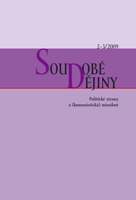Politické hry s „nedokončenou revolucí“: Účtování s komunismem v čase Občanského fóra a po jeho rozpadu (1989–1992)
Political Games with the ‘Unfi nished Revolution’: Settling Accounts with Communism during and after the Civic Forum, 1989–92
Author(s): Jiří SukSubject(s): History
Published by: AV ČR - Akademie věd České republiky - Ústav pro soudobé dějiny
Summary/Abstract: This article discusses the birth and early dynamics of Czech post-Communist anti-Communism. It is based on the recognition that during the political takeover in November and December 1989 the policy of radical discontinuity remained a marginal, practically invisible and inaudible phenomenon in the mostly restful period of civil unrest. In the generally shared atmosphere of ‘national understanding’, which led to the historic compromise between the old, Socialist regime and the new, democratic regime, there was no room for a policy of radically settling scores with the Communist Party and the past. It was all the more surprising, therefore, when demands along these lines (the relinquishing of Party property, the outlawing of the Party, the punishment of criminal and treasonous politicians) appeared as if out of nowhere as early as the beginning of 1990, and then intensified. Memory was awakened and its numerous previously buried levels now emerged in public life. The incursion of the dark, unrecognized, and unprocessed past into the artificial reality of historic compromise caused frustration with ethics in the ranks of the nascent political elite. It was but a small step from the political prisoners’ awakened memories of crimes committed by the recently defeated regime to the now current problems with the ‘nomenclature brotherhoods’ and ‘Communist mafias’ in the provinces and in businesses throughout the country. Calls for a thorough settling of scores were heard with increasing frequency from Civic Forum (Občanske forum), the victorious political movement, and they eventually became the catalyst of the pronounced division within the Civic Forum. But these calls never turned into a decisive political strategy and they managed to hold a dominant place only in the programmes of the less important parties and organizations like the Club of Engage Non-Party Members (Klub angažovanych nestraniků – KAN) and the Confederation of Political Prisoners (Konfederace politickych vězňů). After the break-up of Civic Forum in late 1990 and early 1991, radical anti-Communism ran out steam, and the right-of-centre political parties that emerged from the erstwhile Civic Forum – primarily the Civic Democratic Party, the Civic Democratic Alliance, and the Christian Democratic Party – adapted the originally radical demands to a realistic policy of compromise based on the fact that the Communist Party of Bohemia and Moravia, with the support of more than ten per cent of the electorate, remained a part of the democratic political system. The largely ignored sense of frustration with morals, stemming from the fundamental contradiction between the ideal (that is, comprehensive) possibilities of a policy of settling scores and the real (that is, limited) possibilities, was put off for later years, and remains a public problem to this day.
Journal: Soudobé Dějiny
- Issue Year: XVI/2009
- Issue No: 02-03
- Page Range: 276-312
- Page Count: 37
- Language: Czech

